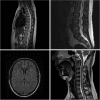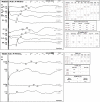Relapsing MRI-negative myelitis associated with myelin-oligodendrocyte glycoprotein autoantibodies: a case report
- PMID: 36002821
- PMCID: PMC9400333
- DOI: 10.1186/s12883-022-02837-5
Relapsing MRI-negative myelitis associated with myelin-oligodendrocyte glycoprotein autoantibodies: a case report
Abstract
Background: Serum antibodies to myelin-oligodendrocyte glycoprotein (MOG) are biomarkers of MOG-IgG-associated disorder (MOGAD), a demyelinating disease distinct from both multiple sclerosis and aquaporin-4-IgG neuromyelitis optica spectrum disorder. The phenotype of MOGAD is broad and includes optic neuritis, transverse myelitis, and acute demyelinating encephalomyelitis. Myelitis is common with MOGAD and typically results in acute and severe disability, although prospects for recovery are often favorable with prompt immunotherapy.
Case presentation: This contribution presents a unique case report of a young male patient exhibiting relapsing myelitis with normal spinal cord and brain magnetic resonance imaging. Comprehensive diagnostic assessment revealed myelin-oligodendrocyte glycoprotein-IgG-associated disorder.
Conclusion: MOGAD is one of the conditions which should be considered in MRI-negative myelitis. The diagnosis, however, may prove difficult, especially if the patient is not exhibiting other neurological symptoms of MOGAD. Conus or epiconus involvement is common in MOGAD; the patient reported herein exhibited incomplete rostral epiconus symptoms which, together with somatosensory evoked potential abnormalities, led to the diagnosis.
Keywords: Case report; Demyelinating diseases; Evoked potentials; Magnetic resonance imaging; Myelin-oligodendrocyte glycoprotein.
© 2022. The Author(s).
Conflict of interest statement
The authors declare that they have no known competing financial interests or personal relationships that could have influenced the work reported in this paper.
Figures
References
-
- Van den Bergh PYK, Hadden RDM, Bouche P, Cornblath DR, Hahn A, Illa I, et al. European Federation of Neurological Societies/Peripheral Nerve Society guideline on management of chronic inflammatory demyelinating polyradiculoneuropathy: report of a joint task force of the European Federation of Neurological Societies and the Peripheral Nerve Society - first revision. Eur J Neurol. 2010;17:356–63. doi: 10.1111/j.1468-1331.2009.02930.x. - DOI - PubMed
Publication types
MeSH terms
Substances
Grants and funding
LinkOut - more resources
Full Text Sources



